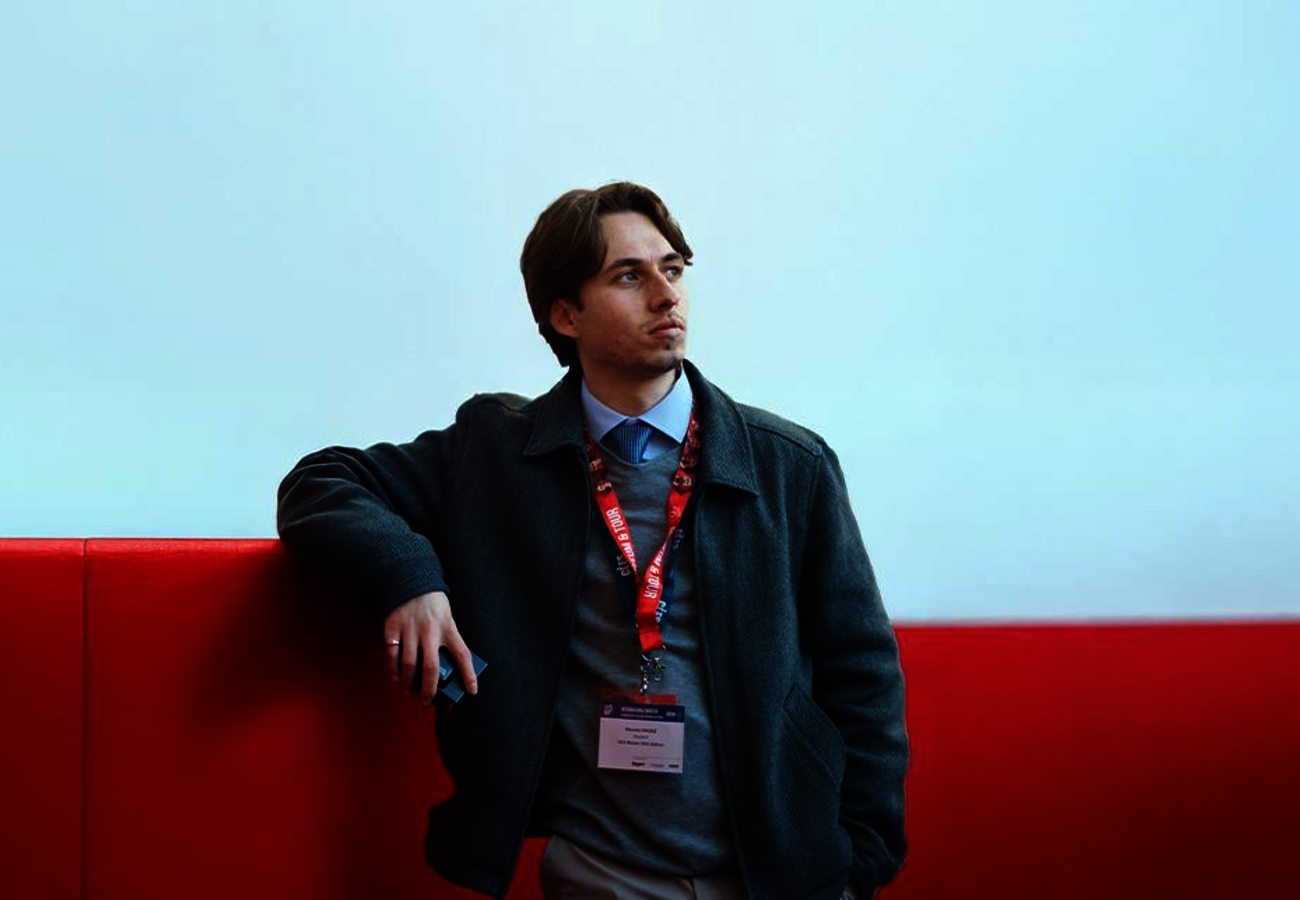BUILT DIFFERENTLY: Nico Ragaz
(FIFA Master 25th edition)

The snow crunches beneath our boots as we climb the mountainside.
“My first sporting memory isn’t on a football pitch,” Nico Ragaz says, pausing for a moment. “The first thing I actually remember was my mum taking me to the service park at the Monte-Carlo rally when I was four or five. I just remember seeing all the cool cars and thinking, I love this.”
It’s mid-April in Switzerland, and we’re making the most of the lingering snow season with a hike at elevation. The only difference between the two of us: Nico is in full ski gear, ready to descend once we reach the top. A lifetime of football has shaped his story, but somewhere along the way, he fell just as deeply for the mountains.
That first memory surrounded by rally cars sparked a love of motorsport that never left him. But for most of his life, it was football, deeply rooted in his family’s story, that defined his path.
Nico’s journey mirrors the Ragaz family tradition: doing things differently. His father had once pursued a footballing dream with Grasshopper Club Zürich, then pivoted into finance and moved the family to Monaco. “The Ragaz family was always a bit different,” Nico says. “Did stuff for themselves, thought differently. And that kind of got instilled in me from an early age.”
Growing up in Monaco came with both privilege and perspective. “I was surrounded by people that weren’t from just one place,” he explains. “So, I learned quickly that the world works differently internationally than in your local village.” Playing football across the south of France further opened his eyes. “It helped me realize how unfortunate some people are – and that I can’t just play around and do whatever I want with my privilege.”
At six, Nico joined the AS Monaco youth setup. It wasn’t the formal academy, but it was serious. “We trained at the professional ground and even got to play matches in the stadium. That’s huge when you’re that age.” His father, who knew both the joy and the heartbreak of football, played an active role. “At first, it was just for fun,” Nico recalls. “But after one game, even though I scored, he was angry with how I played. That’s when I realized he saw something in me. And that maybe I should take it more seriously.”
By fourteen, it was clear that Monaco’s academy wasn’t a long-term option. “They didn’t really promote many from within,” Nico says. So, in true Ragaz fashion, the family looked elsewhere, landing on England. A trial at Southampton showed Nico what elite football really looked like. “The professionalism was just on another level. But technically, I felt like I belonged.”
After a second trial a year later, Southampton passed, but not without opening another door. A scout from Bournemouth had seen him play and extended an offer. While Bournemouth’s Elite Programme was a level below, it still promised elite training and a chance to keep chasing the dream…
…Then Brexit happened.
Regulations around youth transfers left Nico in limbo. Though his family tried to satisfy the residency requirements, the paperwork didn’t hold up. “So, I was there training every day with the team, but I couldn’t play in any official matches,” he says. “It was frustrating. I’d moved to a new country for this, and suddenly, there was no end goal.”
Determined to make the most of his final academy year, Nico trained harder than ever during preseason. But instead of confidence, he felt anxiety creeping in. “No one was forcing me, but it still felt like I had to do it,” he says. “I wasn’t enjoying it anymore. I put so much pressure on myself, I started feeling sick.”
It was his first real encounter with mental burnout.
One of his coaches noticed and encouraged him to take a break. Nico returned to Switzerland over Christmas and, for the first time in years, let football go quiet. “That reset everything,” he reflects. “When I came back, something had shifted. I was playing like I’d never played before.”
For a brief stretch, it worked. “That three-month period showed me that I could play at that level. That I belonged. And knowing that, that was enough.”
Then, something else intervened.
“Covid happened,” he says dryly.
The pandemic shut everything down. Just as he’d fought back into form, lockdowns hit. “I was in the best shape I’d ever been, working out all day, every day, but with nowhere to go. Nothing to show for it.”
It was the second major disruption in as many years and yet another test of his resilience.
With youth football suspended and no pathway into a professional contract, Nico was left with a difficult truth: he might have reached the end of the line as a player. But instead of letting go completely, he pivoted…again.
He enrolled at university in Southampton to study football business and began playing semi-professionally at a non-league club. “It was a completely different world,” he says. “You had guys playing for money to support their families, ex-academy players, weekend warriors. It opened my eyes to how different football can be depending on your context.”
But his body was done. A nagging hip injury turned serious. “Eventually, the doctor told me, ‘If you want to be physically active again, you need to stop.’” And just like that, playing professionally was off the table.
Even after stepping away from playing, Nico wasn’t ready to walk away from football entirely.
To stay involved, he took up a coaching role. “I didn’t love it,” he admits, “but it kept me close to the game.” What truly opened his eyes, though, was university. His degree in football business introduced him to the world behind the scenes, including governance, operations, and something that struck a deep chord: player care.
“I did my final project on how mental wellbeing impacts performance in young players,” he says. “It came from my own experience of moving countries, dealing with pressure, injuries. I started to realize: someone needs to be there for these players off the pitch.”
That insight landed him a job at West Ham United FC in player support, helping young players and their families adjust to life in a new country. “It wasn’t glamorous, but it mattered. I knew how brutal that transition could be because I’d lived it.”
But even that wasn’t the final destination. “I liked the job, but I knew I didn’t want to stay in that role forever,” he says. Once again, Nico sat down with his dad to talk about what was next. That conversation led him to the FIFA Master. “The second I read about it, I thought, this is made for me. I had the international background, the playing experience, and I wanted to understand sport from every angle, not just football.”
Nico applied, knowing he might be the youngest in the room. But he made his case. “I told them: I may not have ten years of work experience, but I’ve lived this, every step of it.”
And while football had shaped his foundation, the FIFA Master’s programme has given him space to explore what has always lingered: motorsport.
His love for racing never went away. As a kid, he’d dreamed of becoming a driver. As an adult, he found new ways in, attending historic races in the UK, talking to teams, and eventually, picking up a camera. “Three years ago, I found my grandfather’s old film camera,” he says. “I’d always loved photography, but that made it personal.”
That grandfather, a Ragaz, had also been a car lover – and a chauffeur, small business owner, and pastry chef. “He did a bit of everything,” Nico says. “Kind of like me.” And the camera became a tether.
Just two days before the FIFA Master began, Nico shot his first race weekend as a credentialed photographer at the Goodwood Revival Festival. “It felt like everything had come full circle. My earliest memory was watching rally cars. And here I was, back at the track, but this time, part of it.”
Today, he’s exploring ways to contribute to motorsport beyond the lens through marketing, partnerships, and increasing access to a sport still dominated by privilege. “Right now, motorsport is a rich kid’s game,” he says bluntly. “But there are programmes changing that. And if I can be part of that change, I will.”
He has even competed in amateur karting himself. “It’s fun, but it also helps me understand what young drivers go through. Motorsport may look different from football, but the pressure, the costs, the system, it’s not that far off.”
And while his path has shifted from chasing goals to creating opportunities, Nico isn’t ruling anything out. “Maybe one day I’ll be an agent,” he says with a grin. “For drivers. For players. Who knows?”
For now, he’s exactly where he needs to be – doing things, as always, a little differently.
By Geneva Decker
FIFA Master 25th edition student
FIFA Master - International Master in Management, Law and Humanities of Sport, ranked Europe's No.1 course a record 12 times by SportBusiness.
FIFA Master - 25 years of Excellence in Sport Business Education - organised by CIES in partnership with De Montfort University (UK), SDA Bocconi School of Management (Italy) and the University of Neuchâtel (Switzerland).









